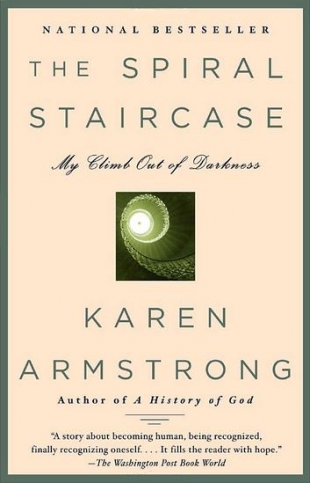A memoir recommended for those facing disappointments and making major changes in their lives.
Karen Armstrong is the author of many books including A History of God, The Battle for God, Islam and Visions of God. She is also the author of three television documentaries. Since September 11, 2001, Armstrong has been a frequent contributor to conferences, panels, newspapers, periodicals, and media outlets on both sides of the Atlantic on the subject of Islam. She lives in London.
In this intriguing spiritual autobiography, Armstrong picks up where her 1982 memoir Through the Narrow Gate left off, with the culture shock that accompanied her departure after seven years from the Catholic convent she had joined when she was an ardent, idealistic, and immature seventeen year old. Although already enrolled at Oxford University, the author is unprepared for the feeling of living in a twilight zone. Armstrong isolates herself from others and sees a psychiatrist for three years during which she is hospitalized, given drugs, and attends therapy sessions. It is only later that she discovers that her physical and mental ailments stem from epilepsy. But the biggest shock of all comes when the examiner for Oxford rejects her doctoral thesis and she is forced to take a job teaching at a private girl's school in London.
Throughout all these changes, Armstrong laments her inability to pray and her lack of a genuine sense of God's presence in her life. But like the poet T .S. Eliot in Ash Wednesday (the poem that opens this book), she persists and eventually comes to see that her spiritual recovery is taking place at its own pace and in its own sweet ways.
Armstrong regains her poise while doing research for a television documentary on St. Paul. This spurs her interest in both Judaism and Islam. For those religions, right practice is more important than right belief. While writing Muhammad: A Biography of the Prophet, Armstrong comes to respect his struggle with doubt, grief, and despair. She concludes that "religion is born out of desperation, horror, and vulnerability as well as from moments of sublime thought."
Armstrong also develops a sense of compassion for her own questing. Fred Burnham, director of the Trinity Institute at Trinity Church Wall Street, tells her: "You always claim that you never had a religious experience. But I disagree. I think you are constantly living in the dimension of the sacred. You are absorbed in holiness all the time!" And so Armstrong is today still spending her days thinking and talking about God, religion, and spirituality.
